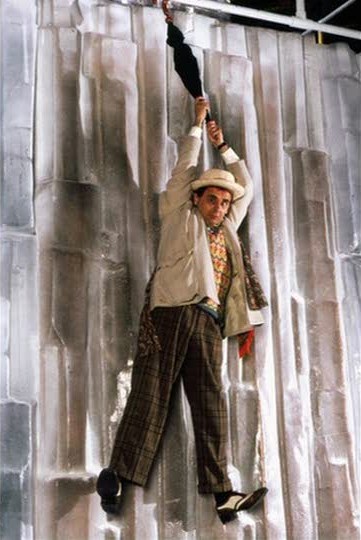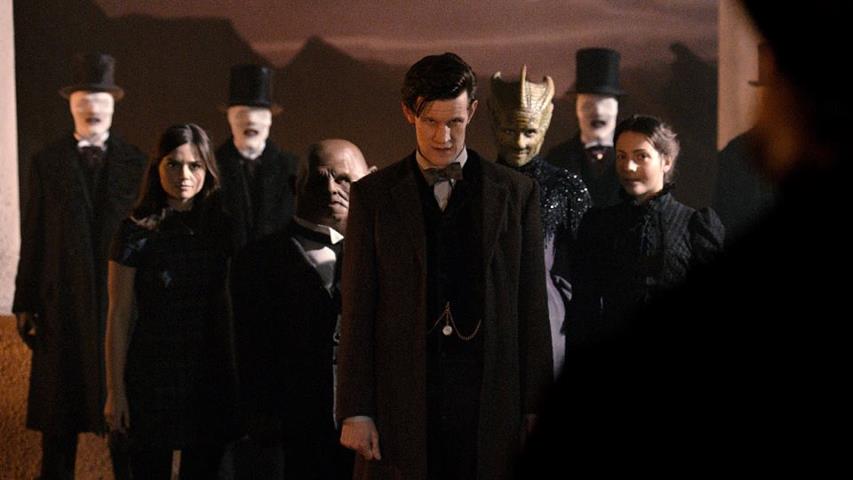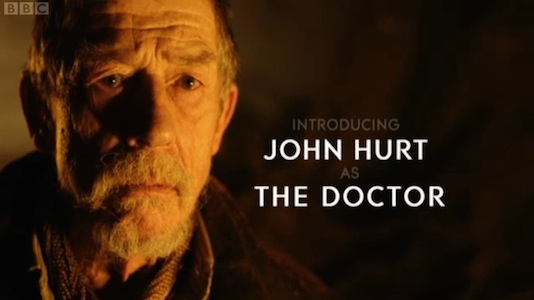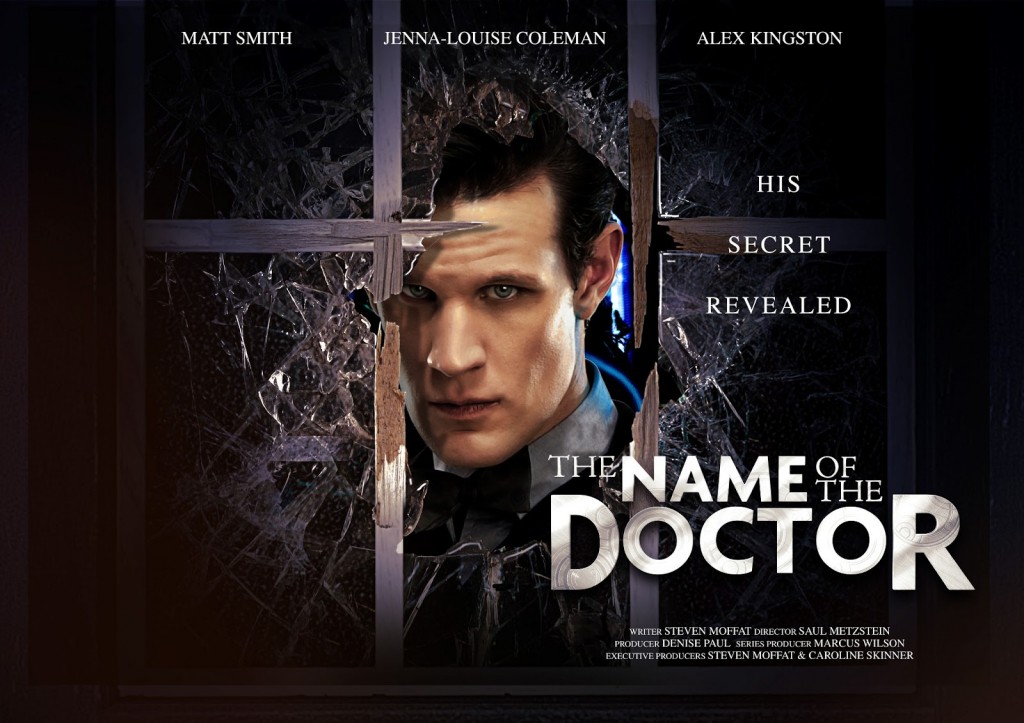 It’s here – our last (ever?) Doctor Who review. James Willets hammers the final nail into the coffin of Series 7b. Can it make up for the past six weeks of disappointment?
It’s here – our last (ever?) Doctor Who review. James Willets hammers the final nail into the coffin of Series 7b. Can it make up for the past six weeks of disappointment?
I think we’re going to face a problem here, because there are essentially two things to consider with ‘The Name Of The Doctor’. The first is the episode itself; the plot driven bit that sought to wrap up the loose ends of the last few episodes, in particular the status of Clara as The Impossible Girl scattered through time. The second is the ending of the episode; not the culmination of the plot itself, although we’ll discuss that too, but the very final surprise, a moment which is going to overshadow the rest of the episode somewhat.
‘The Name Of The Doctor’ had a lot of things to do here. It’s been an odd season which has commendably tried to react to past criticisms of the complexity of the River Song story-arc and yet has somehow wound up being not large enough in its scope and ambition and slightly too obsessed with the usual minutiae to work. I think that we can now say that the structure of the series needs to have some two-parters to work, and that stand alone episodic blockbusters may make great posters but have rarely made excellent stories.
Looking back over the whole of new-Who there are certainly very few of those great, standout episodes that you could truly call cinematic. They’re more noticeable for their smaller scale, especially in ‘Blink’, ‘The Doctor’s Wife’ and ‘Midnight’, probably three of the best. Certainly none of these can be boiled down to movie poster pitch, which is supposedly what has been looked for this year. For me, that’s been a negative and the status of Clara as totally underdeveloped is a consequence of not giving her time to grow, with everything having to be wrapped up inside of a single slot.
 Still, there have been some highlights, and everything nicely built to this episode, which managed to immediately set itself apart from previous season finales, and certainly made itself seem a little bit more important with the initial presentation of Clara scattered through the life of the previous incarnations of the Doctor. Unfortunately, what followed wasn’t a romp through the past adventures of the various faces, but more generic fare.
Still, there have been some highlights, and everything nicely built to this episode, which managed to immediately set itself apart from previous season finales, and certainly made itself seem a little bit more important with the initial presentation of Clara scattered through the life of the previous incarnations of the Doctor. Unfortunately, what followed wasn’t a romp through the past adventures of the various faces, but more generic fare.
Having opened with an almost séance that collects the important players (The Paternoster Gang, Clara and River Song), Moffat goes on to introduce The Whisper Men, villains who feel a little bit too familiar after the Slenderman and Hush-inspired Silence. There are obvious similarities there, and it wouldn’t surprise me to see the two appear together at some point. I will be more disappointed if we don’t get further monsters who have developed without noses, ears or a sense of touch.
They’re nothing like as terrifying as the silence, even if Moffat tries to drop them in with some foreshadowing in the form of a creepy rhyme, something that’s served to announce the presence of monsters for far too long to be anything but disquieting, but which is starting to fall flat from overuse after the seemingly interminable verses of ‘A Good Man Goes To War’.
We even get the dead people talking through technology that Moffat loves as well, but despite an excellent start between the companions, things actually begin to fall a bit flat with the introduction of the Doctor himself. At this point he’s left in the position of being a passenger to the plot, adding nothing to actually working out the mystery or solving the problems caused by the Great Intelligence. His presence is only seemingly required at all so that a door can be opened (he doesn’t do this himself in the end) and to dump information onto the audience as and when it’s required.
Way back in ‘Asylum of the Daleks’ I complained that making your main character totally superfluous to events is a curious way to open a new series. It’s even more confusing when it’s the finale of the same series, and I don’t know if there’s meant to be some bookending symmetry on display here but, once again, apropos of nothing, Clara saves the day. By stepping into a floaty glowing DNA strand, and scattering herself back through time and space.
This is actually one of the most genuinely agreeable notions in Doctor Who finale history – they stepped into time and space and tried to re-write the history of the Doctor. After the nonsense and confusion of previous episodes’ attempts to wrap up a plot arc, it was nice to see a solution that anyone could follow.
Again we get a lovely sequence of Clara appearing in classic Who episodes, and eventually directing the original Doctor to his TARDIS all the way back in the very beginning. It’s a great moment to tie everything together before the 50th Anniversary, and a nod to Classic Who fans who were probably starting to worry that Moffat may be taking them for granted.
But this is where the episode begins to break down a little bit, because after half an hour of raising the stakes through the rood about the consequences of the Doctor crossing his own timeline, about the danger of going to his own grave, about how doing exactly what Clara does will definitely, unequivocally destroy her – the Doctor jumps into his own time signature to save her.
Now, the Doctor has done some incredibly stupid things in the past and it’s not exactly a shock to see him do something potentially reality threatening. That is, after all, what time travellers do – mess with reality in ways that could have pretty serious consequences for the rest of us. Still, I would prefer that his first choice wasn’t just to jump in after her and that be all fine for everyone.
We saw the consequences of messing around in the timeline – the destruction of the known universe, the death of Jenny and the reversal of Strax to his Sontaran nature… It’s a neat way of showing what will happen without the Doctor in a way that doesn’t require the full ‘Turn Left’ treatment.
But overall there was little threat. The Whispermen are nothing bad guys. The ‘death’ of Jenny lasts only so far as her next scene, their attack on Strax and the others inconveniences them for a time, after which they get over it.
Still, all of this does lead us nicely to that final reveal, the one that wasn’t included in the preview tapes sent out in advance and pretty much straight away launches us into the next story arc.
John Hurt’s appearance, presumably as the incarnation that ended the Time War, destroyed the Time Lords and was just an all-round not Doctory sort of guy was a BIG surprise. It was one of the episode’s big ‘WHAT?!’ moments (along with Clara on Gallifrey at the beginning). I hadn’t got a clue what was coming there and it was all the better for it. Having done whatever he did “without choice … in the name of peace, and of sanity” it’s going to be great to see how that plays out.
Which I guess is the best thing that can be said after a season finale. I’m more stoked to see what comes next than I was at the beginning of the episode.
And that’s your lot, ladies and gents. It just remains for us to thank James for turning in so many consistently in-depth and entertaining reviews over the years. (Seriously, some of them have been better than the episodes he was critiquing). You can read more of his reviews at his blog, Take Me To The Bookshelf. It’s well worth a visit!





Totally pants. The show not the review. I only watch it for JLC.
They have recycled the same show ever since they brought it back. The Doctor is god like, threatens all the bad guys, but actually you never see him do anything that is truly “powerful”. Rather like having a TV series about a gunslinger in the Old West and never see him firing a shot. If they reveal too much of the Doctor’s back story they will destroy the show. I think the reason why the Doctor is a bit two dimensional is he would detract from the assistant too much if he had a personality or real gravitas.
How many times are they going to play the assistant is an ordinary woman but some is the key to some great cosmic mystery? Really this is so boring. Look at the assistants from the Classic Era all of who had personalities. They were all individuals. And why do we have to all this flirting? The Classic Era show demonstrated that men and women can have platonic relationships. Why bring sex into it? Easier than perhaps thinking something up original?
And this banging on about that the human is race special. Over and over and over again. Yet for the most part humanity is shown in the show to be a bit thick……..